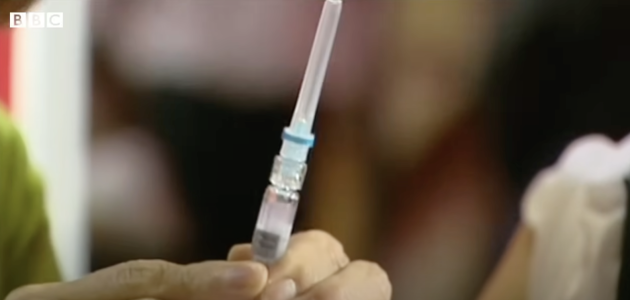HPV “cures” you can do at home? The truth behind these online “remedies” revealed!
- Replies 2
Disclaimer: The information provided in this article is for educational purposes only and is not intended as a substitute for professional medical advice, diagnosis, or treatment. Always consult your physician or other qualified healthcare providers with any questions you may have regarding a medical condition or before making any changes to your health regimen.
In the age of information overload, where a quick Google search can yield millions of results, it's no surprise that myths and misconceptions about health can spread like wildfire.
This is particularly true for HPV, or human papillomavirus, a common sexually transmitted infection (STI) that has been the subject of much online debate and misinformation.
We believe in empowering our readers with accurate, reliable information, especially when it comes to their health. So let's set the record straight about HPV, the myths surrounding “cures,” and the truth about the vaccine.
Scrolling through social media platforms like TikTok and Facebook, you might come across videos and posts promoting “natural remedies” for HPV or questioning the safety of the HPV vaccine.
These claims often lack scientific backing and can be dangerous, leading people to forgo proven medical treatments in favor of untested methods.
Misinformation continues to spread widely, despite the vaccine being known to help with decreasing rates of cancer.
HPV–human papillomavirus–is indeed the most common STI, with the Centers for Disease Prevention and Control (CDC) estimating that 13 million people, including teens, become infected annually. A majority of people show no signs or symptoms.

According to Daniel Boatman, assistant professor at West Virginia University School of Medicine, the goal is to "inoculate" people to misinformation using facts about the vaccine.
“We know that it affects health behavior,” Boatman, who reviewed HPV vaccine misinformation across Facebook, TikTok and X, said “We have to take the time to understand the specific messages, narratives and the conversations that are going on.”
While most infections go away on their own without causing any health problems, HPV can sometimes lead to warts on genitals, hands, the heels of feet, children’s faces, beard areas, legs, or even cancer.
The virus spreads through skin contact, not bodily fluids, as per the University of Washington Medicine. It can only live in certain cells on top of the skin or soft tissues in the body’s canals or organs.
Also read: Doctors plead: Over 50? This is the must-have vaccine before winter!
Around 40 of over 200 HPV strains spread through sexual intercourse, and 12 of all strains can lead to cancer, according to the National Cancer Institute. The most common cancers are cervical, vaginal, penile, anal, and head and neck cancers. It leads to around 36,000 cases in men and women.
This is where the vaccine Gardasil-9 comes into play, targeting the types of HPV most likely to cause these serious health issues, preventing up to 90% of cancers caused by HPV.
Gardasil-9 is a vaccine that protects against nine types of HPV, including those that most commonly cause cancer. Since its introduction, there has been a significant drop in HPV infections and related conditions.
“The vaccine is well known to be very, very safe and very, very effective, especially against the cancer-causing strains of HPV,” shared Dr. Marc Grella, a pediatrician at MassGeneral Hospital for Children.
For instance, CDC data shows an 88% decrease in infections among teenage girls and an 81% decrease in young adult women for the HPV strains that cause most cancers and genital warts.
Source: Healthcare Triage / Youtube.
Despite the vaccine's success, myths persist, particularly the unfounded claim that it can lead to infertility. This has been debunked by numerous studies and health professionals.
In fact, it's the cancer that can develop from an HPV infection that poses a real threat to fertility, not the vaccine.
The vaccine is recommended for both boys and girls, ideally starting before their 15th birthday, to maximize its effectiveness. A first dose can be given as early as nine years old.
It's also available for adults in a three-dose series. With over 135 million doses distributed in the US, the vaccine's safety profile is well-established.
Despite the clear benefits of the HPV vaccine, vaccination rates have seen a decline, which may be partly due to the COVID-19 pandemic disrupting regular medical visits.
Research suggests earlier vaccination provides longer immunity, Grella stated. Adults can get the vaccine usually in three doses.
It's important to note that while any vaccine can have side effects, the vast majority of people experience nothing more than a sore arm.
Source: BBC News / Youtube.
Eileen Lind, pediatric oncology nurse from the Dana-Faber Cancer Institute says that “What can affect fertility, however, is the cancer that develops from an HPV infection from one of
the dozen cancerous strains of the virus.” Some usually have no symptoms, but some experience a sore arm from the shot, said the CDC.
Like with any vaccine, you may also experience dizziness or fainting, but this is more common with adolescents, as per Grella.
The federal Vaccine Adverse Event Reporting System monitors vaccine safety, and ongoing surveillance has not found any significant safety concerns related to the HPV vaccine.
The internet is awash with claims about “curing” HPV at home and unfounded fears about the vaccine.
Additionally, the spread of misinformation online, including discussions of lawsuits against the vaccine's manufacturer, Merck, has contributed to vaccine hesitancy. On social media, it’s a common myth that the HPV vaccine leads to infertility among children–but this is not true.
Source: Michigan Medicine / Youtube.
Merck has also stated that, “Regulatory agencies have continued to conclude HPV vaccines are safe and effective, as have 30 years of research. Clinical trials have included over 70,000 people with up to 14 years of follow-up monitoring after vaccination.”
The truth is, there is no home remedy that can cure HPV, and the vaccine is a safe and effective way to prevent the potential health complications associated with the virus.
Also read: Are you over 50? The CDC urges you to get this essential vaccine for your health!

Have you or someone you know been affected by HPV? What are your thoughts on the vaccine? Share your experiences and questions in the comments below!
In the age of information overload, where a quick Google search can yield millions of results, it's no surprise that myths and misconceptions about health can spread like wildfire.
This is particularly true for HPV, or human papillomavirus, a common sexually transmitted infection (STI) that has been the subject of much online debate and misinformation.
We believe in empowering our readers with accurate, reliable information, especially when it comes to their health. So let's set the record straight about HPV, the myths surrounding “cures,” and the truth about the vaccine.
Scrolling through social media platforms like TikTok and Facebook, you might come across videos and posts promoting “natural remedies” for HPV or questioning the safety of the HPV vaccine.
These claims often lack scientific backing and can be dangerous, leading people to forgo proven medical treatments in favor of untested methods.
Misinformation continues to spread widely, despite the vaccine being known to help with decreasing rates of cancer.
HPV–human papillomavirus–is indeed the most common STI, with the Centers for Disease Prevention and Control (CDC) estimating that 13 million people, including teens, become infected annually. A majority of people show no signs or symptoms.

Misinformation about the HPV vaccine, claiming “natural cures” and spreading infertility myths, has proliferated on social media platforms. Image source: BBC News / Youtube.
According to Daniel Boatman, assistant professor at West Virginia University School of Medicine, the goal is to "inoculate" people to misinformation using facts about the vaccine.
“We know that it affects health behavior,” Boatman, who reviewed HPV vaccine misinformation across Facebook, TikTok and X, said “We have to take the time to understand the specific messages, narratives and the conversations that are going on.”
While most infections go away on their own without causing any health problems, HPV can sometimes lead to warts on genitals, hands, the heels of feet, children’s faces, beard areas, legs, or even cancer.
The virus spreads through skin contact, not bodily fluids, as per the University of Washington Medicine. It can only live in certain cells on top of the skin or soft tissues in the body’s canals or organs.
Also read: Doctors plead: Over 50? This is the must-have vaccine before winter!
Around 40 of over 200 HPV strains spread through sexual intercourse, and 12 of all strains can lead to cancer, according to the National Cancer Institute. The most common cancers are cervical, vaginal, penile, anal, and head and neck cancers. It leads to around 36,000 cases in men and women.
This is where the vaccine Gardasil-9 comes into play, targeting the types of HPV most likely to cause these serious health issues, preventing up to 90% of cancers caused by HPV.
Gardasil-9 is a vaccine that protects against nine types of HPV, including those that most commonly cause cancer. Since its introduction, there has been a significant drop in HPV infections and related conditions.
“The vaccine is well known to be very, very safe and very, very effective, especially against the cancer-causing strains of HPV,” shared Dr. Marc Grella, a pediatrician at MassGeneral Hospital for Children.
For instance, CDC data shows an 88% decrease in infections among teenage girls and an 81% decrease in young adult women for the HPV strains that cause most cancers and genital warts.
Source: Healthcare Triage / Youtube.
Despite the vaccine's success, myths persist, particularly the unfounded claim that it can lead to infertility. This has been debunked by numerous studies and health professionals.
In fact, it's the cancer that can develop from an HPV infection that poses a real threat to fertility, not the vaccine.
The vaccine is recommended for both boys and girls, ideally starting before their 15th birthday, to maximize its effectiveness. A first dose can be given as early as nine years old.
It's also available for adults in a three-dose series. With over 135 million doses distributed in the US, the vaccine's safety profile is well-established.
Despite the clear benefits of the HPV vaccine, vaccination rates have seen a decline, which may be partly due to the COVID-19 pandemic disrupting regular medical visits.
Research suggests earlier vaccination provides longer immunity, Grella stated. Adults can get the vaccine usually in three doses.
It's important to note that while any vaccine can have side effects, the vast majority of people experience nothing more than a sore arm.
Source: BBC News / Youtube.
Eileen Lind, pediatric oncology nurse from the Dana-Faber Cancer Institute says that “What can affect fertility, however, is the cancer that develops from an HPV infection from one of
the dozen cancerous strains of the virus.” Some usually have no symptoms, but some experience a sore arm from the shot, said the CDC.
Like with any vaccine, you may also experience dizziness or fainting, but this is more common with adolescents, as per Grella.
The federal Vaccine Adverse Event Reporting System monitors vaccine safety, and ongoing surveillance has not found any significant safety concerns related to the HPV vaccine.
The internet is awash with claims about “curing” HPV at home and unfounded fears about the vaccine.
Additionally, the spread of misinformation online, including discussions of lawsuits against the vaccine's manufacturer, Merck, has contributed to vaccine hesitancy. On social media, it’s a common myth that the HPV vaccine leads to infertility among children–but this is not true.
Source: Michigan Medicine / Youtube.
Merck has also stated that, “Regulatory agencies have continued to conclude HPV vaccines are safe and effective, as have 30 years of research. Clinical trials have included over 70,000 people with up to 14 years of follow-up monitoring after vaccination.”
The truth is, there is no home remedy that can cure HPV, and the vaccine is a safe and effective way to prevent the potential health complications associated with the virus.
Also read: Are you over 50? The CDC urges you to get this essential vaccine for your health!
Key Takeaways
- Misinformation about the HPV vaccine, claiming "natural cures" and spreading infertility myths, has proliferated on social media platforms.
- The HPV vaccine Gardasil-9 is highly effective, preventing over 90% of cancers caused by HPV, and since the introduction of the first vaccine, there has been a significant drop in HPV infections and related cancers.
- Common misinformation includes false claims about the vaccine causing infertility, despite clear evidence demonstrating its safety and effectiveness.
- Ongoing lawsuits and online discussions may contribute to hesitation or refusal of the vaccine, despite robust evidence and health authority assurances that the vaccine is both safe and lifesaving.
Have you or someone you know been affected by HPV? What are your thoughts on the vaccine? Share your experiences and questions in the comments below!
Last edited:






